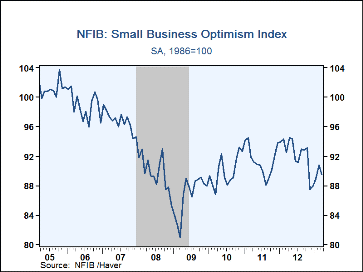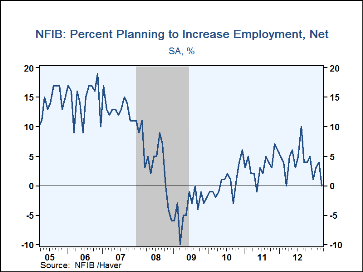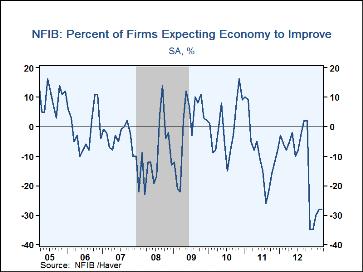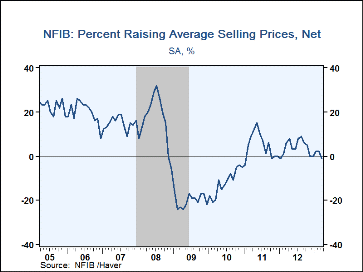 Global| Apr 09 2013
Global| Apr 09 2013U.S. Small Business Optimism Backpedals; Employment Readings Weaken
by:Tom Moeller
|in:Economy in Brief
Summary
The National Federation of Independent Business reported that its March Small Business Optimism Index fell after three months of increase. The decline in the seasonally adjusted index to 89.5 from 90.8 in February left the index well [...]
The National Federation of Independent Business reported that its March Small Business Optimism Index fell after three months of increase. The decline in the seasonally adjusted index to 89.5 from 90.8 in February left the index well below its high of 94.5 in April of last year.
A net zero percent of firms planned to increase employment, the weakest reading in a year. Also in the jobs picture, the percent of firms with positions they were not able to fill reversed February's rise with a decline to 18%. Finally, the percentage of firms planning to raise worker compensation ticked up to 9% but remained below last year's high of 12%.
A stable but depressed net negative 28% of firms expected the economy to improve. The percent expecting higher real sales in six months pulled back to -4, its least since November. The percentage of firms reporting that credit was harder to get dropped sharply to 4% and remained down versus the early-2009 high of 16%. A diminished -1% were lifting average selling prices and a lower 17% were planning to raise prices.
The most important problems faced by small business were taxes (23%), government requirements (21%), poor sales (17%), insurance cost & availability (8%), inflation (7%), competition from large businesses (6%), cost of labor (6%), quality of labor (5%) and financial & interest rates (3%).
Roughly 24 million small businesses exist in the U.S. and they create 80% of all new jobs. The typical NFIB member employs 10 people and reports gross sales of about $500,000 a year. The NFIB figures can be found in Haver's SURVEYS database.
Stress Testing Banks: What Have We Learned? is yesterday's speech by Federal Reserve Chairman Ben S. Bernanke and it is available here.
| National Federation of Independent Business | Mar | Feb | Jan | Mar'12 | 2012 | 2011 | 2010 |
|---|---|---|---|---|---|---|---|
| Small Business Optimism Index (SA, 1986=100) | 89.5 | 90.8 | 88.9 | 92.5 | 92.2 | 91.4 | 89.9 |
| Firms Expecting Higher Real Sales In Six Months (Net %) | -4 | 1 | -1 | 8 | 2 | 3 | 1 |
| Firms Expecting Economy To Improve (Net %) | -28 | -28 | -30 | -8 | -9 | -9 | -1 |
| Firms With Positions Not Able To Fill Right Now (Net %) | 18 | 21 | 18 | 15 | 17 | 14 | 10 |
| Firms With Few or No Qualified Applicants For Job Openings (Net %) | 36 | 34 | 34 | 32 | 35 | 32 | 27 |
| Firms Reporting That Credit Was Harder To Get (Net %) | 4 | 7 | 7 | 11 | 8 | 10 | 13 |
| Firms Raising Avg. Selling Prices (Net %) | -1 | 2 | 2 | 6 | 4 | 5 | -12 |
Tom Moeller
AuthorMore in Author Profile »Prior to joining Haver Analytics in 2000, Mr. Moeller worked as the Economist at Chancellor Capital Management from 1985 to 1999. There, he developed comprehensive economic forecasts and interpreted economic data for equity and fixed income portfolio managers. Also at Chancellor, Mr. Moeller worked as an equity analyst and was responsible for researching and rating companies in the economically sensitive automobile and housing industries for investment in Chancellor’s equity portfolio. Prior to joining Chancellor, Mr. Moeller was an Economist at Citibank from 1979 to 1984. He also analyzed pricing behavior in the metals industry for the Council on Wage and Price Stability in Washington, D.C. In 1999, Mr. Moeller received the award for most accurate forecast from the Forecasters' Club of New York. From 1990 to 1992 he was President of the New York Association for Business Economists. Mr. Moeller earned an M.B.A. in Finance from Fordham University, where he graduated in 1987. He holds a Bachelor of Arts in Economics from George Washington University.
More Economy in Brief
 Global| Feb 05 2026
Global| Feb 05 2026Charts of the Week: Balanced Policy, Resilient Data and AI Narratives
by:Andrew Cates










